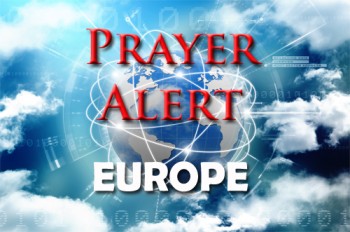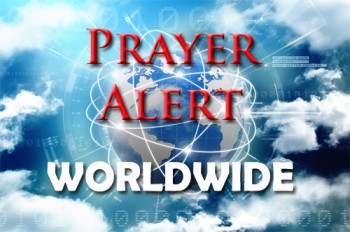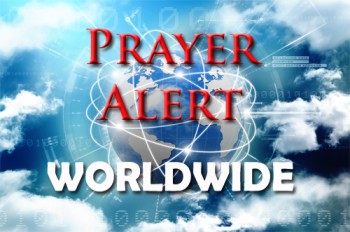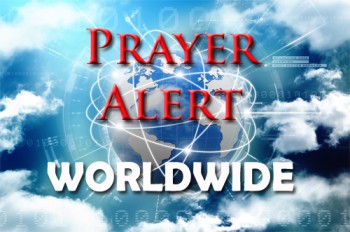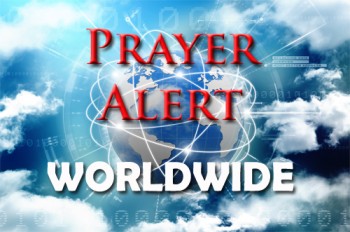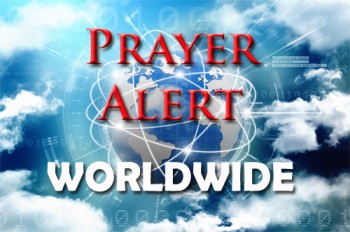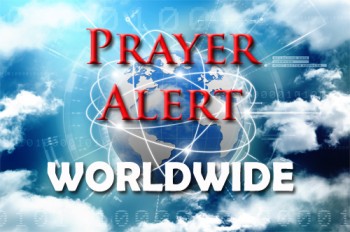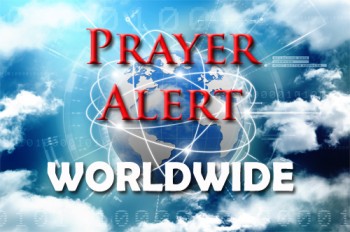
David Fletcher
David Fletcher is Prayer Alert’s Editor.
He is part of a voluntary team who research, proof-read and publish Prayer Alert each week.
If you would like to make a donation towards our running costs, please click here.
Romania has taken over the presidency of the EU for six months. Historically Romanians have been under foreign occupation for most of their existence, but have kept their linguistic identity and Christian faith in spite of rulers with different cultures and religions. Currently Romania is governed by the Social Democratic Party, which contains numerous corrupt leaders who have changed the laws so that they cannot be taken to court. On an economic level, they have imposed some populist measures that have put the country in a difficult situation. Because of this there have been numerous demonstrations by people desiring integrity and justice in their country. Companies are going bankrupt, resources are depleted, and over five million people have emigrated. Romania is being threatened by Russia because she is strategically situated with access to the Black Sea. Meanwhile, President Klaus Johannis is a Christian, and the impact of Christians in society is growing.
The Bishop of Southwark was one of fifteen bishops who visited the Holy Land for ‘2019 Holy Land Coordination’. A communiqué issued by this group said: ‘We have seen how there are Israeli citizens from many different backgrounds who coexist and work together for the common good of our society. Christians there make a vital contribution, especially through schools, hospitals, involvement in public life, and attempting to build bridges between different faiths. Yet it is clear that they also face profound difficulties across all aspects of their lives. Along with Palestinian Arab citizens and migrants, many Christians are systematically discriminated against and marginalised. Those we met expressed particular concern about the Nation State Law that was recently passed. They warn that this creates a constitutional and legal basis for discrimination against minorities, undermining the ideals of equality, justice and democracy. We stand with Israel’s Christians and all those challenging discrimination, in support of their call to protect the country’s pluralism.’
Figures for the persecution of Christians have shown a 'shocking increase', by 13.9% according to Open Doors World Watch List 2019. Asia has a sharp rise. China rose 16 places to number 27, with new laws to control all expressions of religion. Some church leaders say it is the worst since the Cultural Revolution ended in 1976. India, the world's largest democracy, is now number 10 on the list. Hindu extremists act with impunity, violently attacking Christians and churches and non-Hindu religious minorities. Rising nationalism is leading to persecution in Bhutan, Myanmar and Nepal, where national identity is tied to religion and those from minority faiths are considered outcasts. Persecution in North Korea has been worse than any other country for the last 18 years. In the north and middle of Nigeria, 3,700 Christians were killed for their faith - almost twice as many as the previous year.
The risks journalists take when reporting on corruption continue. Ahmed Hussein-Suale, an undercover journalist working on an investigation with the BBC about corruption in Ghana’s football leagues, was shot and killed after a politician called for retribution against him. In Turkey, journalist Pelin Ünker was found guilty of ‘defamation and insult’ and sentenced to thirteen months in jail for her work on the Paradise Papers investigation into offshore tax havens. Turkey has the world’s worst record for jailing journalists - 68 in prison at the end of 2018, all of them facing charges of crimes against the state. Journalists play a vital role in exposing the corrupt and their methods; but they face threats, violence, arrest, and death as a result. Since 2017, over 190 journalists have been incarcerated worldwide for reporting on corruption. See also
On 24 January Venezuela’s opposition leader Juan Guaidó swore himself in as the rightful head of state, with the support of the USA and other nations in the region, as he attempts to remove President Maduro. He now faces the daunting task of establishing a transition plan without control over crucial state institutions and armed forces that have, so far, disowned him. Venezuela's churches have called for prayer as pressure mounts on Maduro to step down. Mass demonstrations against the economic mismanagement that has caused widespread poverty have been taking place. Pastor Samuel Olson, president of the Evangelical Council of Venezuela (ECV), invited the nation to pray 'together as a family, asking God that through His Holy Spirit He would care for, direct, and bless our nation in this critical hour of its history'. ECV are backing Juan Guaidó as the man 'called to conduct the nation in this period of transition'. See also
Zimbabwe is going through an economic crisis and is battling severe fuel shortages. The government recently announced a 150% petrol price increase, igniting widespread discontent, strikes and violent demonstrations. Then, while President Mnangagwa was out of the country, seeking much-needed foreign investment, police and soldiers launched large-scale operations against suspected protesters, activists and strike organisers. At least twelve people were killed and 78 treated for gunshot injuries, according to a local human rights group which recorded over 240 incidents of assault and torture and 700 arrests. People were hunted down in their homes by security forces and severely beaten, with arrests continuing after Mnangagwa had returned. He said, ‘Violence or misconduct by our security forces is unacceptable and a betrayal of the new Zimbabwe.’ Accused of conducting a deadly crackdown on dissent, the army and police denied any wrongdoing, saying some assailants raiding homes were wearing official uniforms to pose as security personnel.
At the UN Security Council’s Middle East monthly meeting, the Syrian ambassador threatened an airstrike on Israel’s international airport near Tel Aviv, in retaliation for Israeli air force attacks on military targets at Damascus and elsewhere in the country. When the Syrian war erupted, Israel stated it would stay out of the conflict unless actions were hostile to the Jewish state, including the transfer of arms to Iranian proxy Hezbollah. As indications grew that Iran was exploiting the void left by the Syrian turmoil to build its own presence there, Israel vowed to act against Tehran’s entrenchment, and has repeatedly attacked Iranian targets. After a daytime Israeli strike on Damascus airport, an Iranian-made surface-to-surface missile was fired from Syria into the Israeli side of the Golan Heights. IDF’s defence system intercepted the rocket. This escalation is seen as the most serious in many months.
An Oxfam report, released to coincide with the International Economic Forum at Davos, reveals that the world’s 26 richest people own as much as half the planet’s population. Addressing such large disparities may require coordinated action at the global level - for example a wealth tax. The widening gap is hindering the fight against poverty. A 12% increase in the wealth of the very richest contrasts with a fall of 11% in the wealth of the poorest half of the world’s population. In the ten years since the financial crisis, the number of billionaires has nearly doubled. The report said that a wealth tax on the 1% wealthiest would raise enough to educate every child not in school and provide healthcare that would prevent three million deaths. Ten thousand people are dying for lack of healthcare every day. But despite the profound impact of these statistics, there is little sense of urgency to act on any of the issues.
When worship programme Keep on Singing broadcast a special episode from Jordan, God used it powerfully. The programme showed a new vision of Jordanian Christian identity, and featured worship songs by a band from Karak Evangelical Church. Band member Mawiyah Halasa said they received many calls and messages telling them how large numbers of brothers and sisters who used to come to church had returned to the Lord. Whilst most Christians have relative freedom to practise their faith, converts to Christianity can face serious opposition. Pray that God will protect and bless Jordanian Christians who are under pressure because of their faith. The video has been shared hundreds of times, and viewer comments came both from locals and from those further afield.
The partial federal government shutdown is in its fourth week. When a Baptist pastor in Memphis, Donald Johnson, realised that people in his congregation would be affected by what the president was doing, he stepped in to help them weather an uncertain period of missed paychecks. Having found eight people on the church's database who were federal workers, he collected an offering and had the church's financial board match what was collected. He was able to raise $8,000, enough for $1,000 each.

